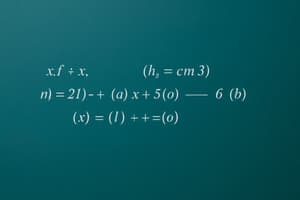Podcast
Questions and Answers
What is a mathematical proof?
What is a mathematical proof?
- An argument for a mathematical statement that shows the logical guarantee of the conclusion using axioms and rules of inference (correct)
- A mathematical expression
- A method of guessing the solution to a mathematical problem
- A statement that has not been proved but is believed to be true
What is a conjecture or hypothesis?
What is a conjecture or hypothesis?
- A proposition that has not been proved but is believed to be true (correct)
- A mathematical expression
- A statement that has been mathematically proven
- A method of guessing the solution to a mathematical problem
What is the philosophy of mathematics concerned with?
What is the philosophy of mathematics concerned with?
- The application of mathematics in the real world
- The role of language and logic in proofs, and mathematics as a language (correct)
- The study of mathematical symbols
- The history of mathematics
What is the primary product of the development of mathematical proof?
What is the primary product of the development of mathematical proof?
What is a nonconstructive proof?
What is a nonconstructive proof?
What are the methods of proof?
What are the methods of proof?
What is the purpose of a proof?
What is the purpose of a proof?
What is the origin of the word 'proof'?
What is the origin of the word 'proof'?
Why is understanding mathematical proofs essential to the field of mathematics?
Why is understanding mathematical proofs essential to the field of mathematics?
Flashcards
Mathematical Proof
Mathematical Proof
A logical argument that demonstrates the truth of a mathematical statement using axioms and rules of inference.
Conjecture
Conjecture
A statement believed to be true, but not yet proven.
Proof Methods
Proof Methods
The process of using logic and symbols to show the truth of a statement.
Direct Proof
Direct Proof
Signup and view all the flashcards
Proof by Contradiction
Proof by Contradiction
Signup and view all the flashcards
Proof by Induction
Proof by Induction
Signup and view all the flashcards
Nonconstructive Proof
Nonconstructive Proof
Signup and view all the flashcards
Communal Standards of Rigor
Communal Standards of Rigor
Signup and view all the flashcards
The Elements
The Elements
Signup and view all the flashcards
Study Notes
Summary Title: Understanding Mathematical Proofs
-
A mathematical proof is an inferential argument for a mathematical statement that shows the logical guarantee of the conclusion using axioms and rules of inference.
-
Proofs are examples of exhaustive deductive reasoning and must demonstrate that the statement is true in all possible cases.
-
A proposition that has not been proved but is believed to be true is known as a conjecture or hypothesis.
-
Proofs employ logic expressed in mathematical symbols and natural language which usually admits some ambiguity.
-
The philosophy of mathematics is concerned with the role of language and logic in proofs, and mathematics as a language.
-
The word "proof" comes from the Latin probare (to test).
-
The development of mathematical proof is primarily the product of ancient Greek mathematics, and one of its greatest achievements was the book, the Elements, by Euclid.
-
Further advances also took place in medieval Islamic mathematics.
-
A proof has to meet communal standards of rigor, an argument considered vague or incomplete may be rejected.
-
Methods of proof include direct proof, proof by mathematical induction, proof by contraposition, proof by contradiction, proof by construction, proof by exhaustion, probabilistic proof, combinatorial proof, and nonconstructive proof.
-
A nonconstructive proof establishes that a mathematical object with a certain property exists without explaining how such an object can be found.
-
Understanding mathematical proofs is essential to the field of mathematics and involves rigorous argumentation, formal language, and logical deduction.Mathematical Proof: An Overview
-
"Proof" in Encyclopædia Britannica.
-
"Mathematical Proof" by Steven J. Miller, Wolfram Demonstrations Project.
-
"Proofs from The Book" by Martin Aigner and Günter M. Ziegler, Springer-Verlag, Berlin, Heidelberg, New York, 1998. An overview of proofs of famous theorems.
-
"The Great Internet Mersenne Prime Search (GIMPS)".
-
"The Ineffable Mystery of God's Location" by Dave Bayer and Persi Diaconis, The College Mathematics Journal, Vol. 23, No. 2 (Mar., 1992), pp. 97–108. A proof of the existence of God based on a variation of the Banach–Tarski paradox.
-
"Proofs and Refutations" by Imre Lakatos, Cambridge University Press, 1976. The book argues against the view that mathematical proofs have an ideal form.
-
"What is a Mathematical Proof?" by David Tall, Department of Education, University of Warwick.
-
"Proofs in Mathematics" by James Franklin, Stanford Encyclopedia of Philosophy, 2017.
Studying That Suits You
Use AI to generate personalized quizzes and flashcards to suit your learning preferences.




